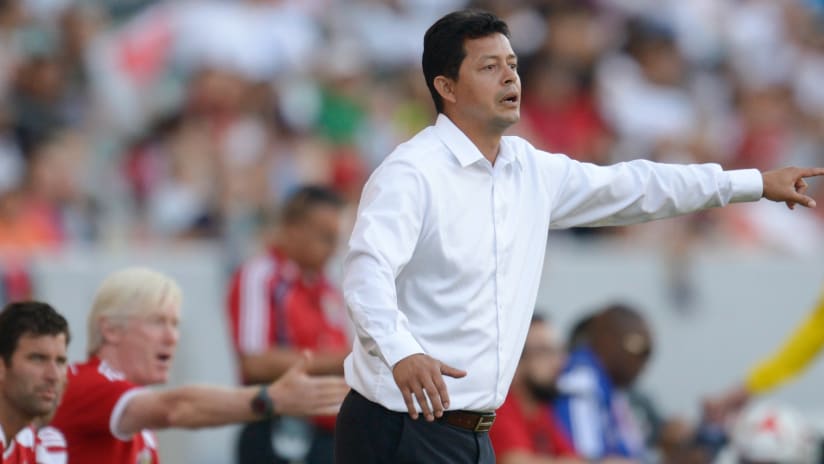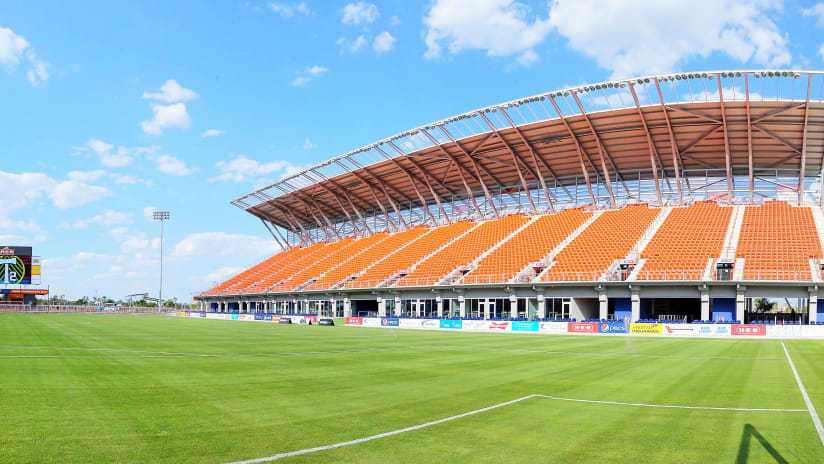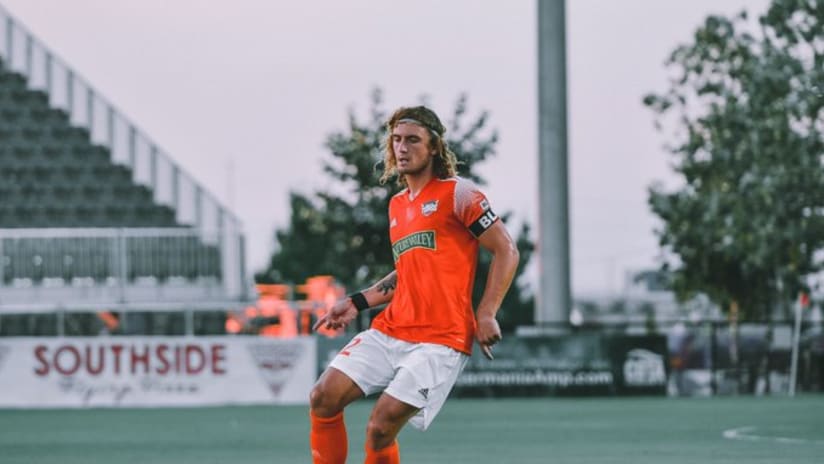For Wilmer Cabrera, the latest stop on his winding career in soccer is Edinburg, Texas. It was an easy decision for the former Colombia national team defender and 1998 World Cup veteran. Cabrera was introduced Wednesday as the first head coach of the Rio Grande Valley FC Toros before a packed auditorium in nearby McAllen, the South Texas city that borders Reynosa, Mexico.
Cabrera’s coaching résumé is a varied one, with four years at the helm of the U.S. Under-17 Residency Program before two years as an assistant coach in MLS and one season as head coach of Chivas USA before the franchise folded last December. After spending the past year scouting nearly every major international tournament in the Western Hemisphere, the opportunity to once again develop young players while joining an MLS franchise was an ideal fit.
“The Houston Dynamo showed they were very interested in me as a coach and my background to develop players and work with professionals," Cabrera told HoustonDynamo.com. "For me, that was one of the key ingredients—I want to be in a place where I am valued as a coach and all the possibilities that I can bring to the club.”
Dynamo general manager Matt Jordan just completed his first year with the club, and among his largest tasks was the launch of a hybrid affiliate for the Dynamo within USL. With a engaged partner in Rio Grande Valley FC and a beautiful 9,400-seat stadium under construction, the next assignment was selecting the club’s first head coach.
“We had a huge amount of interest in the position from coaches who have worked at a very high level,” Jordan said. “We identified Wilmer as a very strong candidate early, but it was important that all of us—Wilmer, Owen (Coyle), Chris (Canetti), Nick (Kowba) and I sat down over the course of a couple days and talked about the project and our goals. Once we visited the RGV area with Wilmer, he really understood how important this was, and the large part he will play.”
“I went down to McAllen and I met the RGVFC partners,” Carbera said. “I saw the quality and effort they are putting into this project, and I felt very comfortable, and it was an easy decision for me.”
Cabrera lives with his family in Colorado after his two-year stint as an assistant coach for Óscar Pareja with the Colorado Rapids from 2012-13. He spent this year in various roles, including scouting and technical study at several tournaments, including the U-20 World Cup qualifying tournament for South America and the U-20 World Cup in New Zealand.
The former defender, who earned 48 caps for Los Cafeteros, will join the Dynamo first team technical staff whenever possible, including the MLS combine and SuperDraft in January and preseason training later the same month. There, he'll be reunited with sports perfomance director Paul Caffrey, whom he served alongside as an assistant in Colorado then brought to Chivas USA as his primary assistant, and forward Erick Torres, who scored 15 goals for Chivas USA in Cabrera's lone season in charge. He will then run his own preseason in March ahead of the Toros' debut season in USL, the third division in the U.S. Soccer hierarchy and a league that has exploded to 28 teams for the 2016 season.
The Dynamo are one of 12 MLS clubs to control a roster and technical staff in USL, with the other 11 also managing the business operations of the franchise. The Dynamo and RGVFC are the first hybrid affiliation between the leagues.
“We spoke to a lot of people about Wilmer, and what is unique about him is that he has many different experiences, in particular his time running the U-17 Residency Program,” Jordan said. “He has a proven track record helping those players transition into the pro ranks, and it was clear he can help young players with potential become men. It’s a man’s game, and when you’re a young, talented player, you’re a big fish in a small pond.”
Cabrera led a group of approximately 40 players as head coach of the U.S. U-17 Residency Program in Bradenton, Florida, from October 2007 to January 2012. Starting next year in Edinburg, he will try to recreate a professional atmosphere for a Toros roster that will be a mix of newly signed players from the Dynamo Academy, recent college draft picks, veteran USL players and Dynamo first team players who join the club to rehabilitate injuries and gain match fitness.
“It is important to create an environment for the young players to see how a professional club operates,” said Cabrera. “We will create a professional environment with high standards, and if they want to be a part of the team, they need to adapt to that environment. The good ones will experience that and it will be easier to transition from the USL team to the first team in Houston.”
In year one for the Toros, Cabrera will have to balance the expectations of a new fan base with the goals of the Dynamo, developing players ready to contribute to the first team.
“It is a challenge to create a new team, starting from zero, and to stay competitive in a professional league like USL. We also need to develop players and help them get ready to compete for a spot in the first team. We have to be competitive because the Toros fans will want to see their team perform well.”
One subplot of Cabrera’s appointment to the Dynamo coaching staff is his previous experiences with Pareja, the head coach of Dynamo rival FC Dallas. Cabrera and Pareja won the 1987 South American U-20 Championship to qualify Colombia for the U-20 World Cup. They played for opposing clubs in Colombia before teaming up again for the 1991 Copa America in Chile. A decade later, Pareja picked Cabrera for his coaching staff with the Colorado Rapids. While Cabrera won’t be on the sideline for the Texas Derby next year, the former Colombia teammates will be indirect rivals one again.
“We have been together, and have competed against each other, and that is part of this wonderful environment of soccer. Now we will be in the same state and competing in a big rivalry. That’s why I love this sport—I compete every day. I like to compete and I like the challenge. When it is time to play, I defend my colors, my club, my tradition and my philosophy. It is important that we continue to teach that to the players.”
Colors, club, tradition and philosophy—simple words that define Cabrera’s love for the sport.
“He has such a passion for the game,” said Jordan. “He lives, eats and breathes the game, and our players will greatly benefit from that passion. He had other opportunities, but he chose to be a part of the Dynamo. His background is an incredible fit for that region. It is a very soccer-savvy community, and soccer is a part of their DNA. I think having a guy like Wilmer in that region will be instrumental.”




